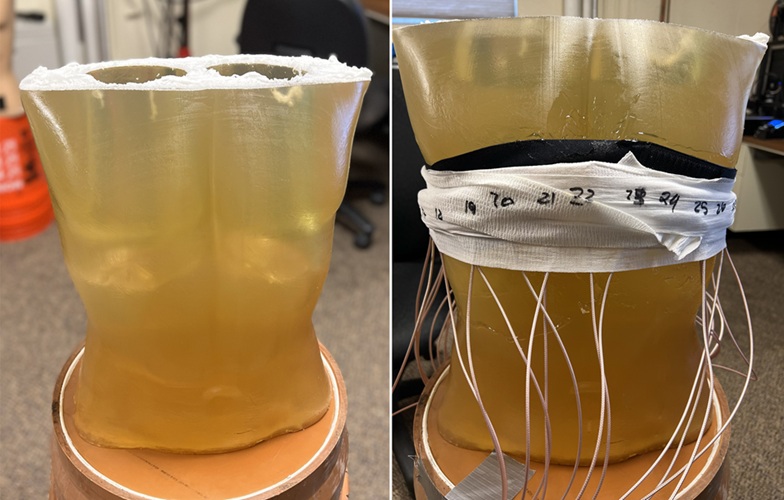Agreement to Market Molecular Breast Imaging Technology from Mayo Clinic
|
By MedImaging International staff writers Posted on 29 Jan 2010 |
Gamma Medica-Ideas, Inc. (GMI; Northridge, CA, USA), a developer of digital molecular imaging systems, has signed an exclusive license and commercialization agreement with the Mayo Clinic (Rochester, MN, USA), to further develop and commercialize a suite of technologies invented by a team of Mayo physicians and scientists, headed by Michael O'Connor, Ph.D.
The company aims to utilize the licensed technology in conjunction with its Lumagem molecular breast imaging system to improve the diagnosis of cancers in women with dense breasts. An estimated 30% of women have dense breast tissue, which can impede diagnosis of abnormalities. Existing mammography and other screening techniques are at times either insufficient or very expensive. Molecular breast imaging, however, promises to be a cost-effective solution for these women.
Dr. Bradley Patt, CEO of GMI said, " We are extremely pleased that Dr. O'Connor and his team at Mayo have chosen GMI to bring their important technology to market. The underlying reason for the controversy in mammography is the fact that mammography has underserved groups of women such as the 40-50 year old age group, where higher breast density has rendered mammography much less effective. GMI's LumaGEM system, now enhanced with Mayo's technologies, will be a highly effective solution for such cases. The Mayo technologies, which have been under development and evaluation for the last seven years, enable this procedure to be performed at a radiation dose comparable to a mammogram.”
The range of technologies invented by Mayo Clinic enhance the existing capabilities of GMI's LumaGEM dual-headed imaging system through special image processing software algorithms and collimator and detector optimization techniques. The license also includes methods and devices developed at Mayo for combining next generation X-ray tomosynthesis techniques with molecular imaging of the breast. In initial clinical studies, the Mayo algorithms licensed to GMI yield better images at lower dose.
Funding from internal sources at Mayo, GMI, and the U.S. National Cancer Institute (Bethesda, MD, USA) has been instrumental in moving the technology forward. Under an International Review Board (IRB)-approved screening study, the technology is already showing promising results with just one-third of the standard dose of Tc-99m Sestamibi typically utilized in the procedure.
According to Dr. O'Connor, "Mayo is looking forward to the collaboration with GMI as we work together to bring this advanced technology to the health care industry. We have used GMI's Lumagem technology combined with our inventions to successfully perform close to 2000 patient studies at Mayo over the past four years. We believe that the combination of GMI's detector technology and the algorithms and techniques developed at Mayo, will enable us to achieve a significant reduction in the radiation dose required for molecular breast imaging, and increase the diagnostic utility of this technique.”
"Over the past few years the need for secondary imaging in breast cancer diagnosis has become obvious. Until now dedicated breast MRI [magnetic resonance imaging] has been useful in helping fill the void, and the number of MRI secondary breast imaging scans has quickly grown to almost one million per year,” commented Dr. Patt. "GMI's LumaGEM product in conjunction with the Mayo technology offers accuracy rivaling MRI, with even better specificity and at a fraction of the cost. We are very excited about the possibility of utilizing this technology to deliver improved quality of care in women's health at a lower cost to the healthcare system.”
Mayo Clinic has one of the most highly evolved intellectual property and technology commercialization efforts in academic medicine. The Office of Intellectual Property at Mayo Clinic serves as a bridge between discoveries and the marketplace.
Gamma Medica-Ideas designs, builds, and services imaging systems based on novel technologies to improve patient health through early diagnosis of disease, improved patient treatment, and by enabling new drug discovery.
Related Links:
Gamma Medica-Ideas
Mayo Clinic
The company aims to utilize the licensed technology in conjunction with its Lumagem molecular breast imaging system to improve the diagnosis of cancers in women with dense breasts. An estimated 30% of women have dense breast tissue, which can impede diagnosis of abnormalities. Existing mammography and other screening techniques are at times either insufficient or very expensive. Molecular breast imaging, however, promises to be a cost-effective solution for these women.
Dr. Bradley Patt, CEO of GMI said, " We are extremely pleased that Dr. O'Connor and his team at Mayo have chosen GMI to bring their important technology to market. The underlying reason for the controversy in mammography is the fact that mammography has underserved groups of women such as the 40-50 year old age group, where higher breast density has rendered mammography much less effective. GMI's LumaGEM system, now enhanced with Mayo's technologies, will be a highly effective solution for such cases. The Mayo technologies, which have been under development and evaluation for the last seven years, enable this procedure to be performed at a radiation dose comparable to a mammogram.”
The range of technologies invented by Mayo Clinic enhance the existing capabilities of GMI's LumaGEM dual-headed imaging system through special image processing software algorithms and collimator and detector optimization techniques. The license also includes methods and devices developed at Mayo for combining next generation X-ray tomosynthesis techniques with molecular imaging of the breast. In initial clinical studies, the Mayo algorithms licensed to GMI yield better images at lower dose.
Funding from internal sources at Mayo, GMI, and the U.S. National Cancer Institute (Bethesda, MD, USA) has been instrumental in moving the technology forward. Under an International Review Board (IRB)-approved screening study, the technology is already showing promising results with just one-third of the standard dose of Tc-99m Sestamibi typically utilized in the procedure.
According to Dr. O'Connor, "Mayo is looking forward to the collaboration with GMI as we work together to bring this advanced technology to the health care industry. We have used GMI's Lumagem technology combined with our inventions to successfully perform close to 2000 patient studies at Mayo over the past four years. We believe that the combination of GMI's detector technology and the algorithms and techniques developed at Mayo, will enable us to achieve a significant reduction in the radiation dose required for molecular breast imaging, and increase the diagnostic utility of this technique.”
"Over the past few years the need for secondary imaging in breast cancer diagnosis has become obvious. Until now dedicated breast MRI [magnetic resonance imaging] has been useful in helping fill the void, and the number of MRI secondary breast imaging scans has quickly grown to almost one million per year,” commented Dr. Patt. "GMI's LumaGEM product in conjunction with the Mayo technology offers accuracy rivaling MRI, with even better specificity and at a fraction of the cost. We are very excited about the possibility of utilizing this technology to deliver improved quality of care in women's health at a lower cost to the healthcare system.”
Mayo Clinic has one of the most highly evolved intellectual property and technology commercialization efforts in academic medicine. The Office of Intellectual Property at Mayo Clinic serves as a bridge between discoveries and the marketplace.
Gamma Medica-Ideas designs, builds, and services imaging systems based on novel technologies to improve patient health through early diagnosis of disease, improved patient treatment, and by enabling new drug discovery.
Related Links:
Gamma Medica-Ideas
Mayo Clinic
Latest Industry News News
- GE HealthCare and NVIDIA Collaboration to Reimagine Diagnostic Imaging
- Patient-Specific 3D-Printed Phantoms Transform CT Imaging
- Siemens and Sectra Collaborate on Enhancing Radiology Workflows
- Bracco Diagnostics and ColoWatch Partner to Expand Availability CRC Screening Tests Using Virtual Colonoscopy
- Mindray Partners with TeleRay to Streamline Ultrasound Delivery
- Philips and Medtronic Partner on Stroke Care
- Siemens and Medtronic Enter into Global Partnership for Advancing Spine Care Imaging Technologies
- RSNA 2024 Technical Exhibits to Showcase Latest Advances in Radiology
- Bracco Collaborates with Arrayus on Microbubble-Assisted Focused Ultrasound Therapy for Pancreatic Cancer
- Innovative Collaboration to Enhance Ischemic Stroke Detection and Elevate Standards in Diagnostic Imaging
- RSNA 2024 Registration Opens
- Microsoft collaborates with Leading Academic Medical Systems to Advance AI in Medical Imaging
- GE HealthCare Acquires Intelligent Ultrasound Group’s Clinical Artificial Intelligence Business
- Bayer and Rad AI Collaborate on Expanding Use of Cutting Edge AI Radiology Operational Solutions
- Polish Med-Tech Company BrainScan to Expand Extensively into Foreign Markets
- Hologic Acquires UK-Based Breast Surgical Guidance Company Endomagnetics Ltd.
Channels
Radiography
view channel
AI Radiology Tool Identifies Life-Threatening Conditions in Milliseconds
Radiology is emerging as one of healthcare’s most pressing bottlenecks. By 2033, the U.S. could face a shortage of up to 42,000 radiologists, even as imaging volumes grow by 5% annually.... Read more
Machine Learning Algorithm Identifies Cardiovascular Risk from Routine Bone Density Scans
A new study published in the Journal of Bone and Mineral Research reveals that an automated machine learning program can predict the risk of cardiovascular events and falls or fractures by analyzing bone... Read more
AI Improves Early Detection of Interval Breast Cancers
Interval breast cancers, which occur between routine screenings, are easier to treat when detected earlier. Early detection can reduce the need for aggressive treatments and improve the chances of better outcomes.... Read more
World's Largest Class Single Crystal Diamond Radiation Detector Opens New Possibilities for Diagnostic Imaging
Diamonds possess ideal physical properties for radiation detection, such as exceptional thermal and chemical stability along with a quick response time. Made of carbon with an atomic number of six, diamonds... Read moreMRI
view channel
New MRI Technique Reveals Hidden Heart Issues
Traditional exercise stress tests conducted within an MRI machine require patients to lie flat, a position that artificially improves heart function by increasing stroke volume due to gravity-driven blood... Read more
Shorter MRI Exam Effectively Detects Cancer in Dense Breasts
Women with extremely dense breasts face a higher risk of missed breast cancer diagnoses, as dense glandular and fibrous tissue can obscure tumors on mammograms. While breast MRI is recommended for supplemental... Read moreUltrasound
view channel
New Medical Ultrasound Imaging Technique Enables ICU Bedside Monitoring
Ultrasound computed tomography (USCT) presents a safer alternative to imaging techniques like X-ray computed tomography (commonly known as CT or “CAT” scans) because it does not produce ionizing radiation.... Read more
New Incision-Free Technique Halts Growth of Debilitating Brain Lesions
Cerebral cavernous malformations (CCMs), also known as cavernomas, are abnormal clusters of blood vessels that can grow in the brain, spinal cord, or other parts of the body. While most cases remain asymptomatic,... Read moreNuclear Medicine
view channel
New Imaging Approach Could Reduce Need for Biopsies to Monitor Prostate Cancer
Prostate cancer is the second leading cause of cancer-related death among men in the United States. However, the majority of older men diagnosed with prostate cancer have slow-growing, low-risk forms of... Read more
Novel Radiolabeled Antibody Improves Diagnosis and Treatment of Solid Tumors
Interleukin-13 receptor α-2 (IL13Rα2) is a cell surface receptor commonly found in solid tumors such as glioblastoma, melanoma, and breast cancer. It is minimally expressed in normal tissues, making it... Read moreGeneral/Advanced Imaging
view channel
CT Colonography Beats Stool DNA Testing for Colon Cancer Screening
As colorectal cancer remains the second leading cause of cancer-related deaths worldwide, early detection through screening is vital to reduce advanced-stage treatments and associated costs.... Read more
First-Of-Its-Kind Wearable Device Offers Revolutionary Alternative to CT Scans
Currently, patients with conditions such as heart failure, pneumonia, or respiratory distress often require multiple imaging procedures that are intermittent, disruptive, and involve high levels of radiation.... Read more
AI-Based CT Scan Analysis Predicts Early-Stage Kidney Damage Due to Cancer Treatments
Radioligand therapy, a form of targeted nuclear medicine, has recently gained attention for its potential in treating specific types of tumors. However, one of the potential side effects of this therapy... Read moreImaging IT
view channel
New Google Cloud Medical Imaging Suite Makes Imaging Healthcare Data More Accessible
Medical imaging is a critical tool used to diagnose patients, and there are billions of medical images scanned globally each year. Imaging data accounts for about 90% of all healthcare data1 and, until... Read more














.jpeg)





